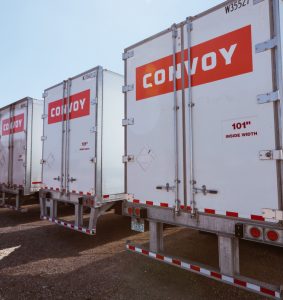- Discover the Rise and Fall of Convoy: Explore how the once-promising startup aimed to revolutionize the trucking industry and why it ultimately failed despite massive venture capital backing and high-tech solutions.
- Impact on the Trucking Community: Uncover the real-life consequences of the Convoy trucking collapse for small businesses and truckers left in the lurch, and what it says about dependency on tech-driven platforms.
- Future of Freight: Delve into how the lessons from Convoy’s ambitious yet flawed model are reshaping strategies within the trucking and freight industries, preparing them for a more sustainable integration of technology.

The dream of reinventing trucking came to a sudden halt, leaving a trail of unfulfilled promises and disrupted lives.
In October last year, the freight industry faced a significant disruption with the Convoy trucking collapse. This event not only symbolized the volatility of tech-driven transformations in traditional sectors but also highlighted the profound impacts on small businesses and independent truckers who depended heavily on Convoy’s digital freight platform. For an overview of recent trends in the trucking industry’s market dynamics, explore this page.
Understanding the Convoy Trucking Collapse
The collapse of Convoy, once heralded as the Uber for trucking, serves as a vivid case study in how venture capital and high technology intersect with traditional sectors like freight hauling. The company’s sudden failure not only marked a stark reminder of the volatile nature of tech-driven businesses but also shed light on the broader impacts on an industry reliant on consistency and trust. Learn more about the economic impacts on the freight industry, check out this page.
The Rise and Fall of a Digital Disruptor
Early Promise and Massive Funding

Venture capital’s big bets on tech can sometimes overlook the real-world complexities of industries like trucking.
Launched with a mission to revolutionize the freight industry, Convoy quickly garnered attention and investment, raising over $1 billion from high-profile investors, driven by the promise of reducing empty miles and cutting operational costs through a tech-first approach. This significant financial backing highlighted a burgeoning interest in modernizing freight through digital solutions. Dive deeper into digital freight solutions and innovation in the trucking sector, follow this link.
Enjoying our insights?
Subscribe to our newsletter to keep up with the latest industry trends and developments.
Stay InformedMarket Realities and Operational Struggles
Despite its innovative technology, Convoy struggled with profitability. The mismatch between its tech-driven solutions and the traditional, regulation-heavy freight industry, compounded by a pandemic-induced shopping slowdown and a decrease in venture capital investments, led to financial instability. These challenges were intensified by a broader economic downturn, which tightened capital markets and reduced consumer spending, undermining the business model that relied heavily on continuous capital infusion.
“The dramatic monetary tightening we’ve seen over the last 18 months has dramatically dampened investment appetite and shrunk flows into unprofitable late-stage private companies” – from a The Loadstar article on the economic factors contributing to the tech startup downturn. [Read more here]
The Impact on the Trucking Community
Immediate Effects on Small Trucking Businesses

Employees and truckers alike were left to navigate the fallout of a startup dream that vanished overnight.
The shutdown of Convoy left numerous small trucking businesses like Eagle Radovish struggling with vanished shipments and substantial unpaid invoices, highlighting the precarious nature of relying heavily on a single digital platform for business operations. This event underscored the domino effect that the failure of a tech-centric company can have on dependent small businesses, many of which faced immediate financial jeopardy.
“Every single penny that we worked for, we lost it” – from a FreightWaves article discussing the financial impact on truckers following Convoy’s collapse. [Read more here].
For additional insights into recent bankruptcies in the trucking industry, visit this link.
Long-Term Implications for the Industry
The broader implications of the Convoy trucking collapse include a heightened awareness of the risks involved in the tech-driven disruption of traditional industries. The collapse has sparked discussions on the sustainability of such disruptions and the resilience of businesses that rely on them. The trucking community’s reaction has been mixed, with some seeing it as a necessary evolution and others as a cautionary tale of tech overreach.
Lessons Learned from the Convoy Experience

The rapid decline of a tech unicorn serves as a cautionary tale of market dynamics overpowering startup optimism.
Convoy’s story is a cautionary tale that highlights the challenges of disrupting a complex and regulated industry through technology alone. It illustrates the critical balance needed between innovation and the nuanced understanding of industry dynamics. The company’s failure has provoked a significant reevaluation of how technology is integrated into traditional industries, urging a more balanced approach that considers existing industry structures. Explore the latest advancements in trucking technology and how they are shaping the future of the industry, discover more here.
Navigating Future Disruptions in Trucking
Looking forward, the trucking industry faces the challenge of integrating technology while maintaining reliability and trust, foundational elements of the freight sector. The legacy of Convoy’s ambition serves as both an inspiration and a warning—encouraging innovation but also emphasizing the need for comprehensive strategies that address both technological potentials and market realities. Understand the strategies being employed in trucking to optimize outcomes, explore this link.
The Human Impact of Convoy’s Shutdown
In the immediate aftermath of Convoy’s unexpected closure, the personal and emotional toll on its employees and stakeholders was starkly revealed. During his poignant final address, Convoy’s CEO, Dan Lewis, articulated his profound disappointment and the collective distress of the team.
“I was hoping for a different, a better outcome for you,” Lewis said finally, according to a recording of the meeting reviewed by Inc. [Read more here]
Lewis confessed, his voice laden with the weight of unmet expectations and the impending loss. This moment, heavy with emotion, underscored not only the financial ramifications but also the deep personal losses experienced by those who had placed their faith in the company’s vision. As the reality of job losses and vanished healthcare benefits set in, the broader implications of the startup’s ambitious failure came into sharp focus, highlighting the often-overlooked human element in the volatile world of tech entrepreneurship.
This shift from corporate collapse to personal crisis painted a vivid picture of the real-world consequences faced by those caught in the wake of technological disruption. Read more about Convoy’s journey and its impact on the trucking and tech industries, learn more here.

Innovation’s allure often comes with unforeseen consequences, impacting those who are least prepared to handle them.
Timeline and Valuation: The Rise and Fall of Convoy
Convoy was founded in 2015 by Dan Lewis and Grant Goodale. It quickly became known as the “Uber for trucking,” aiming to revolutionize the freight and trucking industry with its technology-driven platform. Here’s a brief timeline highlighting key events in Convoy’s lifespan, including its net worth at various points:
Timeline of Convoy’s Lifespan
- 2015: Convoy is founded. The company starts with the goal of digitizing the freight industry by connecting truckers and shippers through an app, similar to how Uber connects drivers and passengers.
- Mid-2015 to 2016: Initial funding rounds take place. The company raises $2.5 million in seed funding within months of launching.
- 2017: Additional funding rounds help propel the company’s growth. Convoy begins to gain significant attention in the tech and trucking industries.
- 2018: The company continues to expand, raising $185 million in a funding round led by Google’s venture capital arm, CapitalG. This round values Convoy at $1 billion, pushing it into unicorn status.
- April 2022: Convoy raises more than $1 billion at a $3.8 billion valuation in what would be its final funding round. High-profile investors include Jeff Bezos, Bill Gates, and others.
- Late 2022 to 2023: The company faces severe challenges. A downturn in consumer spending, a reduction in venture capital funding, and economic pressures from increased interest rates begin to impact the business.
- October 2023: Convoy abruptly ceases operations. The company’s CEO, Dan Lewis, announces the closure in an emotional meeting with employees, citing insurmountable financial difficulties. The closure is precipitated by a failure to secure additional funding or find a buyer.
- Net Worth: At its peak, Convoy was valued at $3.8 billion. This valuation was based on the potential of its business model and the significant venture capital it attracted. However, at the time of its shutdown, the company was facing substantial financial losses and was unable to become profitable.
This timeline encapsulates the rapid rise and abrupt fall of Convoy, reflecting both the potential and the volatility inherent in tech-driven startups within traditional industries like trucking.
—
The Convoy trucking collapse remains a pivotal moment in the tech and trucking industries, offering valuable lessons on the integration of technology in traditional sectors. While the drive towards digital transformation continues, the experience of Convoy highlights the necessity for a strategic approach that respects the complexities of industry ecosystems and the real-world challenges they face. As the market evolves, the story of Convoy will likely continue to influence strategies and decisions within the freight industry for years to come. Stay updated on the challenges and changes in freight brokerage, check out this link.
8 Key Developments from the Convoy Trucking Collapse
- Shutdown Shockwave: The abrupt end of Convoy’s operations sent ripples across the trucking industry, highlighting the vulnerability of businesses reliant on digital platforms.
- Financial Strain on Carriers: Many truckers and freight companies faced severe financial difficulties due to unpaid invoices, emphasizing the need for more robust financial protections in tech-dependent business models.
- Market and Economic Forces: A combination of tightening capital markets and a downturn in the freight industry created a ‘perfect storm’, underscoring the challenges tech startups face in volatile markets.
- Legal Challenges and Debates: The aftermath of Convoy’s collapse saw various legal challenges, which brought to light the complex web of accountability and compensation in tech-driven disruptions.
- Industry’s Response to Technology: Convoy’s innovative approach has forced a reevaluation of how technology is integrated into the freight industry, setting new precedents for future digital brokerage models.
- Adaptation by Competitors: Other companies in the industry are cautiously adopting some of Convoy’s abandoned innovations, proving that while the company failed, its ideas will persist.
- Impact on Trucking Regulations and Policies: The fallout has sparked discussions among policymakers about the need for updated regulations to better govern tech-driven changes in traditional industries.
- Relaunch of Convoy’s Technology by Flexport: Flexport’s acquisition and relaunch of Convoy’s technology indicates a continued belief in the potential of digital freight solutions, aiming to refine the model to prevent future failures.
More News Stories On Convoy
- Convoy Closure: A $3.8 Billion Valuation Falls Amid Freight Recession – Technical issues, unsettled carrier payments, and the broader impact of Convoy’s closure on the digital freight network sector. Venture capital challenges and the failed acquisition attempts during the freight recession. Read more about the closure and its implications here.
- 3 Execs Leave Convoy – Departure of key executives from Convoy, providing insights into the internal changes at the company around the time of its challenges and eventual shutdown. Explore the details on the executive changes here.
- New App Connects Truck Drivers to Freight – Read about Convoy breaking into the scene with an app designed to connect truck drivers directly with freight opportunities, aiming to streamline the process and increase efficiency within the trucking industry. Discover more about here.
Further Reading on Convoy’s Impact and Industry Challenges
- In-Depth Analysis of Convoy’s Downfall: Delve into the comprehensive story behind Convoy’s collapse and its ramifications across the trucking industry at Inc Magazine.
- Financial Struggles for Carriers Post-Collapse: Explore the financial distress faced by truckers left unpaid by Convoy, revealing deeper industry issues at FreightWaves.
- Economic Forces Behind the Tech Shutdown: Understand the economic forces and market dynamics that led to Convoy’s abrupt shutdown at The Loadstar.
- The Broader Industry Aftershock: Find out what the collapse of Convoy means for the future of the transportation industry at Truckstop.
- Understanding the Collapse: Learn more about the crisis in freight tech behind Convoy’s collapse at PitchBook.
- Insights into Tech’s Role in Trucking: Discover how Convoy’s tech-centric approach impacted the trucking industry at GeekWire.





















